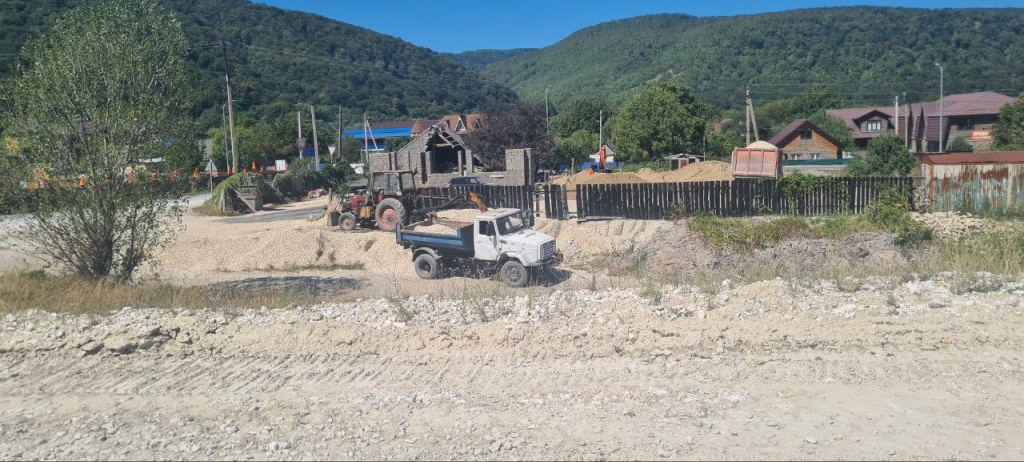
The decision to build a large production facility next to the tourist village was announced by the head of the Republic of Adygea Murat Kumpilov at a meeting with investors of JSC Medvezhya Gora about a year and a half ago. The plant plans to produce materials for dry mixes, aerated concrete blocks and silicate bricks. In August 2024, public hearings were held on the transfer of agricultural land to industrial land. They were organized by representatives of the administration of the Maikop district, the Committee on Architecture and Urban Planning of the Republic and the Medvezhya Gora company. However, residents claim that the hearings were held with violations. For example, there was no information on their holding on the official website, and the draft of the future enterprise was not published, although this is a mandatory requirement of the law. The hearing was attended by people who do not have a local residence permit, who voted for the proposed project. At the same time, some residents of the village could not get into the hall due to limited space. As a result, the vote for the transfer of agricultural land for the construction of the plant to industrial ones passed by a significant margin.
Photo: Alexandra Kontorina/MEDIA-TALK
After these hearings, the activists appealed to the prosecutor's office of the Maikop district of the republic. Representatives of the supervisory authority conducted an inspection and agreed with the residents: there were violations. Based on this, the prosecutor's office filed an administrative lawsuit with the district court. The latter considered the violations to be insignificant and denied the claim. Alexandra Kontorina, an activist from the village of Kamennomostky, who was present at this court hearing, told the editorial board of Media Talk that it passed very quickly, even without arguments between the parties. The court's decision of December 6, which was made by Judge Oksana Beldinova, chairman of the Pyatigorsk branch of the Russian Geographical Society Angelar Asurov calls not logical. "As for me, it's surrealism. It seems to me that there is nothing difficult to schedule a retrial. After all, the prosecutor's office is a supervisory authority. And if they conducted an inspection and found violations, then it would be logical to cancel the results of the hearings and appoint new ones. But it wasn't done."
Photo: Alexandra Kontorina/MEDIA-TALK
Recall that the natural areas around the village of Kamennomostky or, as it is also called Khadzhokh, are popular among fans of ecological and extreme tourism. However, the picturesque beauty of the foothills of the Caucasus may undergo serious changes in the near future. Literally next to the mouth of the Mishoko River, near the waterfalls of the Belaya River and ecological trails, it is planned to build a factory for the production of burnt lime. 400 tons of finished product per day will be produced in furnaces as high as a five-story house at a temperature of several hundred degrees. Then bags of burnt lime are planned to be transported by trucks and railway wagons along village roads (no others are provided) throughout the Caucasus. In the construction sector of the region, the use of its own burnt lime can lead to a reduction in the cost of producing dry mixes, aerated concrete and silicate bricks, where it plays a key role. Currently, lime is being delivered to the Kuban from the Rostov region. The plant will open about a hundred new jobs for the labor market of the republic.
It should be noted that this is not the only trial related to these public hearings that took place in the Maikop District Court. Throughout the autumn, the collective action of the initiative group of the village of Kamennomosky was considered. The violations were almost identical, but there were much more court sessions. At the end of October, Judge Murat Ozhev dismissed the claim, considering the hearings to be in accordance with the law. "So we will learn from the experience further and go to appeal," Anna Manaeva, the chairman of the initiative group of the village, wrote then in her Telegram channel.
By the way, recently the leadership of the Russian Geographical Society received a complaint about the activities of the Kamennomosky eco-activist group, headed by Alexandra Kontorina. The applicant claims that residents interfere with the industrial development of the region through their activities. Angelar Asurov, chairman of the Pyatigorsk branch of the Russian Geographical Society, who oversees the group's activities, explains that activists are not against the development of the region, but industrial enterprises should be safe for the environment and for residents.
Read more about the construction of a fired lime plant in Adygea in our material.